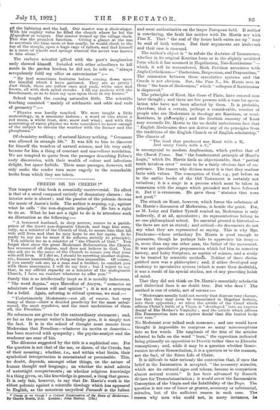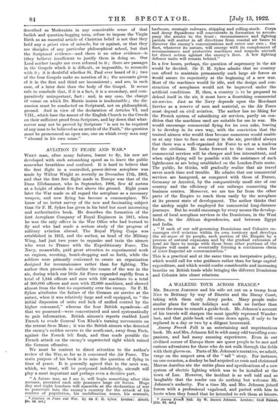CREEDS OR NO CREEDS ?* Tire temper of this book
is essentially controversial. Its effect is that of a creed composed entirely of damnatory clauses : the interior note is absent ; and the passion of the polemic drowns
the music of Aaron's bells. The author is arguing, e.g., against what he calls " the non-dogmatic principle." He has a right
to do so. What he has not a right to do is to introduce such an illustration as the following
A bereaved husband, in deep sorrow, comes to a parish- priest of the (now) non-dogmatic Church, and begs him earn- estly, as a minister of the Church of God, to assure him that hid wife still lives and that he may hope to see her again. Is he really -to say (as he must if he adheres strictly to principle), ' You address me as a minister of " the Church of God." You forget that since the great Modernist Reformation the Church has renounced all dogma, and does not believe in God. You also ask mo in the name of the Church to assure you that your wife still lives. If I did so, I should be asserting another dogma, viz., human immortality, a thing no less impossible. Of course, if you merely ask me, as a man and a brother, to comfort you with these assurances, I will do my best ; but I regret to say that, in my official capacity as a minister of the undogmatic Church, I have no comfort whatever to offer you.' "
Surely this is as intellectually inept as it is morally indecorous. " The word dogma," says Marcellus of Ancyra, " connotes an admixture of human will and opinion " ; it is not a synonym for a belief. Again, referring to ethical systems, we read :— " Unfortunately Modernists—mot all, of course, but very many of them--show a decided proclivity for the most unbal- anced, the most repulsive, and the most unchristian of them all, the Freudian."
No references are given for this extraordinary statement ; and, so far as the present writer's knowledge goes, it is simply not the fact. It is in the school of thought most remote from
Modernism that Freudisiu—whatever its merits or demerits— has been received with sympathy ; the psycho-analyst and the confessor are near of kin.
The dilemma suggested by the title is a sophistical one. For the question is not that of the use, or disuse, of the Creeds, but
of their meaning ; whether, i.e„ and within what limits, their symbolical interpretation is necessitated or permissible. This,
no doubt, depends, amongst other things, on the nature of human thought and language; Cu whether the mind admits of watertight compartments ; on whether religious knowledge is a thing given, or, like knowledge in general, a thing that grows.
It is only fair, however, to say that Dr. Harris's work is the ablest polemic against a scientific theology which has appeared in English, as the notorious encyclical Passeauti is the fullest * Croats Of 110 creeds a critical Examination of tie Bait of Modernism. .By Charles Han*, D.D. London ; John Murray. Lisa.] and most authoritative on the larger European field. If neither is convincing, the fault lies neither with Dr. Harris nor with Pius X. That " the zeal of thy house hath eaten me up " may
be said of both writers. But their arguments are irrelevant and their case is unsound.
The author's object is " to refute the doctrine of Immanence, whether in its original Kantian form or in the slightly modified form which it has assumed in Hegelianism, Neo-Kantianism "- which, it will be remembered, Mark Pattison associates with Anglo-Catholicism—" Euckenism, Bergsonism, and Pragmatism." The connexion between these speculative systems and the Creeds is not obvious. But, like Pius X., Dr. Harris sees in them " the basis of Modernism," which " collapses if Kantianitim is disproved."
The principles of Kant, like those of Plato, have entered into later thought ; and there are few persons with a turn for specu- lation who have not been affected by them. It is probable, therefore, that a certain, perhaps a considerable, number of people who are Modernists in theology are Kantiane, or semi- Kantians, in philosophy ; and the Scottish ancestry of Kant may reconcile Dr. Harris to the no doubt unfortunate feet that " English Modernism does not derive any of its principles from the traditions of the English Church or of English scholarship." The climate of " The land that produced one Kant with a K, And many Cants with a C,"
is uncongenial to modern Anglicanism, which prefers that of the Church Times. But " the fundamental principle of Hegel's Logic," which Dr. Harris finds so objectionable, that " partial truth involves error " seems to be a fairly obvious fact of ex- perience. The reason why divines resent it is that they oonfuse facts with values. The conception of God, e.g., put before us in the earlier books of the Old Testament is certainly not
valueless ; it is a stage in a process which must be taken in connexion with the stages which preceded and have followed it. But it is erroneous. He gave them " statutes that were not good."
The attack on Kant, however, which forms the substance of Dr. Harris's discussion of Modernism, is beside the point. For, as M. Loisy and Father Tyrrell remind us, Modernism is only indirectly, if at all, speculative ; its representatives belong to no one philosophical school. Its essential ground is historical— the facts are not as stated ; and critical—its documents do not
say what they are represented as saying. This is why Mgr. Duchesne—whose orthodoxy Dr. Harris is good enough to
guarantee, though he perhaps fails to appreciate his irony— is, more than any One other man, the father of the movement.
It was not speculative prepossession which led him to conceive history, and Loisy Scripture, as matter of science, and a study to be treated by scientific methods. Neither of these distin- guished men was a philosopher ; and, if either developed any
tendency to speculative system (which is more than doubtful), it was a result of his special studies, not of any preceding habit
of mind.
That they did not think on Dr. Harris's essentially scholastio and dialectical lines is no doubt true. But who does ? The
method is one of eristic, not of science;— "-Modernists usually hold not merely that dogmas may change, but that they may even be transmuted in Hegelian fashion, into their opposites ; as when the artiole of the Creed which affirms Christ's birth of a Virgin is ' developed ' into an express denial of His Mother's Virginity ; and the article which affirms His Resuarection into an express denial that His buried body ever rose."
No Modernist ever talked such nonsense ; and one would have thought it impossible to compress so many misconceptions into so few words. The emphasis of the first of the articles referred to falls on the word " born," the opposition indicated being primarily an opposition to Docetic rather than to Ebionite conceptions ; and, while it may be a question whether Resur- rection involves Resuscitation, it is a question as to the manner, not the fact, of the Risen Life of Christ.
It is difficult to take seriously the contention that, if once the belief in the Incarnation is accepted, " the accessory miracles,
which are its outward signs and tokens, become in comparison almost natural events." It has been advanced by Bomish
divines for Transubstantiation ; it would cover the Immaculate Conception of the Virgin and the Infallibility of the Pope. The
question is not one of lesser or greater, accessory or substantial, miracles, but of the sufficient reason in each case. The reason why men who could -not, in many instances, be described as Modernists in any conceivable sense of that foolish and question-begging term, refuse to impose the Virgin Birth as an essential article of Christian belief is not that they hold any a priori view of miracle, for or against, or that they are disciples of any particular philosophical school, but that the Scriptural evidence—and there is no other evidence—is (they believe) insufficient to justify them in doing so. Our Lord neither taught nor even referred to it ; there are passages in the Gospels which it is difficult, or impossible, to reconcile with it ; it is doubtful whether St. Paul ever heard of it ; two of the four Gospels make no mention of it ; the accounts given of it in the first and third are inconsistent ; and are, in each case, of a later date than the body of the Gospel. It seems safe to conclude that, if it is a fact, it is a secondary, and com- paratively unimportant, fact : and, in any case, the change of venue on which Dr. Harris insists is inadmissible ; the dis- cussion must be conducted on Scriptural, not on philosophical, ground. And in view of the declaration of Articles VL and VIII., which base the assent of the English Church to the Creeds on their sufficient proof from Scripture, and lay down that what- soever may not be proved by Scripture " is not to be required of any man to be believed as an article of the Faith," the question must be pronounced an open one, one on which every man may " abound in his own sense."



































 Previous page
Previous page